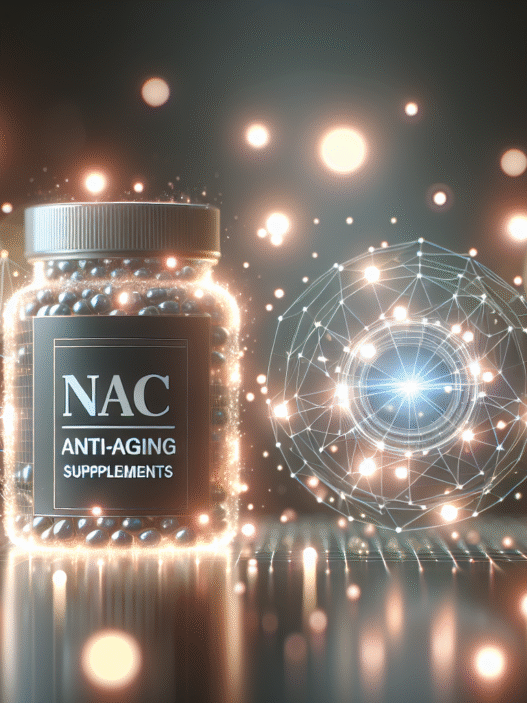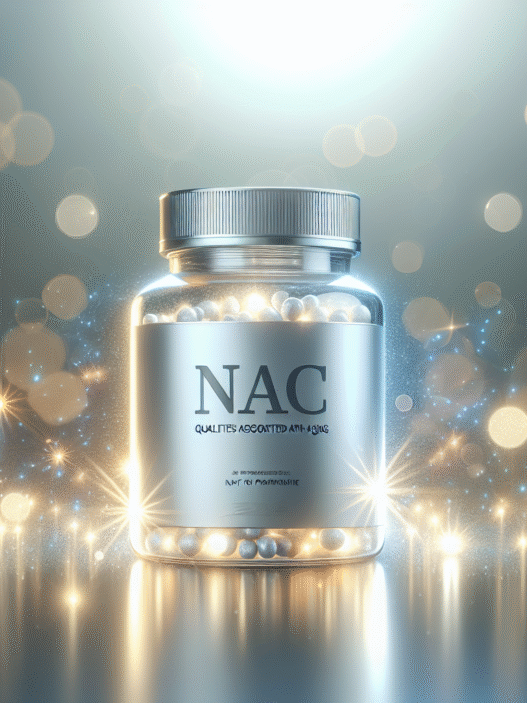Understanding NAC Antioxidant Properties
N-Acetyl Cysteine (NAC) is gaining attention for its notable antioxidant properties that contribute to various health benefits. Understanding its uses, approvals, and mechanisms of action is essential for those concerned about liver health or seeking longevity.
Uses and Approvals
NAC has received approval from the FDA for specific medical uses. It is primarily recognized for its efficacy in treating potentially hepatotoxic doses of acetaminophen (APAP). When administered within eight hours post-ingestion, NAC boasts almost 100% effectiveness in preventing liver damage. Beyond acetaminophen overdose, NAC is also approved for treating various respiratory conditions including pneumonia, bronchitis, cystic fibrosis, and post-traumatic chest injuries.
| Condition | Approval Status |
|---|---|
| Acetaminophen Overdose | FDA-approved (high effectiveness) |
| Pneumonia | FDA-approved |
| Bronchitis | FDA-approved |
| Cystic Fibrosis | FDA-approved |
Mechanisms of Action
The therapeutic effectiveness of NAC arises from several mechanisms. It provides cysteine, a vital component for glutathione production, which is a dominant antioxidant in the body. Additionally, NAC functions by binding to toxic metabolites, scavenging free radicals, and improving oxygen delivery to tissues. Its ability to maintain cellular redox balance is primarily linked to its antioxidant and anti-inflammatory activities, which are vital in combating diseases associated with oxidative stress.
NAC enhances intracellular glutathione concentration, assisting in the neutralization of cell-damaging free radicals. This mechanistic insight reveals why NAC is considered a potent supplement for reducing the risk of various health conditions, including heart disease and diabetes.
The antioxidant effects of NAC make it a valuable addition to a health regimen for those aiming to detoxify and enhance their longevity. Those seeking more information on specific benefits can refer to our articles on n-acetyl cysteine benefits and nac supplement benefits.
Benefits of NAC Supplementation
N-Acetyl Cysteine (NAC) supplementation is gaining attention for its diverse health benefits, particularly in relation to its antioxidant properties. This section highlights the key advantages associated with NAC supplementation, including its hepatoprotective effects, anti-inflammatory properties, and overall antioxidant capacity.
Hepatoprotective Effects
NAC is well-known for its hepatoprotective effects, making it a popular choice for promoting liver health. This supplement helps to elevate glutathione levels, which is vital for detoxification and protecting liver cells from damage. Studies indicate that NAC can be effective in preventing liver injury from acetaminophen overdose by enhancing the liver’s ability to detoxify harmful substances (WebMD).
| NAC Benefits | Description |
|---|---|
| Hepatoprotective | Protects liver cells from damage |
| Detoxification | Enhances liver’s ability to eliminate toxins |
Anti-inflammatory Properties
One of the significant benefits of NAC lies in its anti-inflammatory properties. NAC assists in reducing inflammation throughout the body, which is essential for maintaining overall health. By decreasing inflammation, NAC can help to alleviate symptoms associated with chronic conditions, such as respiratory diseases and other inflammation-related ailments. The ability of NAC to reduce swelling and irritation contributes to improved health outcomes for individuals concerned about conditions linked to chronic inflammation (WebMD).
| Anti-inflammatory Benefits | Description |
|---|---|
| Reduces swelling | Alleviates symptoms associated with chronic conditions |
| Supports overall health | Helps mitigate inflammation-related health issues |
Antioxidant Capacity
NAC’s primary advantage arises from its capacity as a powerful antioxidant. This supplement not only aids in the production of glutathione, one of the body’s most critical antioxidants, but also assists in neutralizing harmful free radicals. By scavenging these cell-damaging oxidants, NAC can potentially reduce the risk of several chronic conditions, including heart disease and diabetes.
| Antioxidant Properties | Description |
|---|---|
| Boosts glutathione | Increases the body’s supply of a key antioxidant |
| Reduces oxidative stress | Helps minimize the risk of chronic diseases |
NAC supplementation offers a range of benefits that appeal to those focused on liver health and longevity. Supplementing with NAC can support detoxification processes, alleviate inflammation, and enhance the body’s natural antioxidant defenses. For more detailed information on the benefits of NAC, you can refer to our sections on n-acetyl cysteine benefits and nac supplement benefits.
NAC in Liver Health
N-Acetyl Cysteine (NAC) plays a significant role in supporting liver health, particularly in treating liver injuries and enhancing overall liver function.
Treatment Potential for Drug-induced Injury
NAC is FDA-approved for the treatment of potentially hepatotoxic doses of acetaminophen (APAP). It is nearly 100% effective if administered within 8 hours of ingestion. Its therapeutic effects stem from various mechanisms: NAC provides cysteine for glutathione production, binds to toxic metabolites, scavenges free radicals, and increases oxygen delivery to tissues (NCBI Bookshelf).
Efficacy of NAC for Acetaminophen Overdose
| Mechanism | Description |
|---|---|
| Glutathione Production | Provides cysteine necessary for glutathione synthesis. |
| Binding to Toxic Metabolites | Binds with harmful compounds to reduce their effects. |
| Free Radical Scavenging | Neutralizes harmful free radicals to limit cellular damage. |
| Oxygen Supply Enhancement | Improves oxygen delivery to liver tissues. |
Effects on Liver Function
NAC’s impact on liver function extends beyond its use in acute overdose scenarios. By supporting glutathione synthesis, a critical antioxidant for liver health, NAC helps in the detoxification processes and may protect against chronic liver damage. Research suggests that NAC can have favorable effects on patients with severe liver injury, particularly those with chronic liver disease. In such cases, NAC’s pharmacokinetics can be altered, resulting in different absorption and clearance rates compared to healthy individuals (PMC).
Pharmacokinetics of NAC in Liver Health
| Patient Condition | NAC Clearance Characteristics |
|---|---|
| Healthy Individuals | Normal clearance and distribution rates. |
| Chronic Liver Disease | Altered clearance and increased serum concentration. |
| End-stage Renal Disease (ESRD) | Reduced total NAC clearance compared to healthy controls. |
These insights into the nac antioxidant properties highlight NAC’s dual role in managing acute drug-induced injuries and promoting long-term liver health. Understanding these benefits makes NAC a valuable supplement for those concerned with liver health and longevity.
NAC and Respiratory Conditions
N-Acetyl Cysteine (NAC) has garnered attention for its multiple benefits in respiratory health. It exhibits mucolytic and anti-inflammatory effects that can significantly aid individuals with various pulmonary conditions.
Mucolytic and Anti-inflammatory Effects
NAC functions primarily as an antioxidant and expectorant, which helps reduce inflammation and mucus production in the respiratory tract. This is particularly beneficial for those suffering from chronic obstructive pulmonary disease (COPD) or chronic bronchitis. By acting on the airways, NAC can help improve symptoms, reduce exacerbations, and slow the decline of lung function in COPD patients (Healthline).
In nebulized form, NAC demonstrates mucolytic, anti-inflammatory, and antioxidant properties, making it a potential therapeutic option for individuals with conditions such as cystic fibrosis. Its unique properties contribute to better airway clearance and improved lung function by thinning mucus.
| Effect | Description |
|---|---|
| Mucolytic | Breaks down and thins mucus, making it easier to expel from the respiratory tract. |
| Anti-inflammatory | Reduces inflammation in the airways, easing breathing difficulties. |
| Antioxidant | Protects lung cells from oxidative damage, promoting overall lung health. |
Research in Pulmonary Diseases
Ongoing studies are investigating the full scope of NAC’s therapeutic efficacy in various pulmonary diseases. Researchers are particularly interested in its effects in conditions exacerbated by oxidative stress, like COPD and asthma. NAC’s ability to enhance intracellular glutathione levels allows for a better counteraction of oxidative stress, which is critical in managing these health issues (PMC).
Research has also indicated that NAC might help manage symptoms related to obesity, which can lead to sleep apnea and worsen respiratory function. The benefits include reducing systemic inflammation and oxidative stress, thereby potentially controlling complications in obesity-related health issues (WebMD).
By emphasizing its roles in mucolytic and anti-inflammatory actions, alongside ongoing research into its broader implications, NAC emerges as a valuable supplement for individuals focusing on lung health and longevity. For further information on the benefits of NAC supplementation, refer to our article on n-acetyl cysteine benefits.
NAC’s Role in Neurological Health
N-Acetyl Cysteine (NAC) plays a significant role in supporting neurological health. Its unique properties contribute to brain function and may hold promise in addressing various neurodegenerative conditions.
Impact on Brain Function
NAC is crucial for maintaining healthy brain activity, primarily through its regulation of glutamate levels. Glutamate is an essential neurotransmitter, but excess amounts can lead to brain damage. NAC helps in modulating these levels, ensuring optimal brain function. Research indicates that NAC may improve conditions such as bipolar disorder, schizophrenia, obsessive-compulsive disorder, and substance use disorder by alleviating symptoms and cravings Healthline.
| Condition | Potential Effects of NAC |
|---|---|
| Bipolar Disorder | Reduces symptoms |
| Schizophrenia | Alleviates symptoms |
| Obsessive-Compulsive Disorder | Decreases symptoms |
| Substance Use Disorder | Reduces cravings |
Potential for Neurodegenerative Diseases
NAC’s ability to replenish glutathione, a powerful antioxidant, and regulate glutamate levels positions it as a potential therapeutic agent for neurodegenerative diseases like Alzheimer’s and Parkinson’s diseases. Animal studies suggest that NAC supplementation may lead to improvements in cognitive function and dopamine regulation.
For individuals concerned about longevity and neurological health, NAC supplementation may offer supportive benefits. Understanding the NAC antioxidant properties can aid in making informed decisions about its use.
Research continues to explore NAC’s role in neurological health, and ongoing studies may further elucidate its potential in preventing or managing neurodegenerative conditions. Individuals interested in enhancing their brain health may consider integrating NAC into their health regimen, with attention to recommended dosages and potential applications in their overall well-being. For details on suggested dosages, refer to our article on n-acetyl cysteine dosage.
Safety and Considerations
Administration Adjustments
When considering N-acetyl cysteine (NAC) supplementation, it is essential to adjust the administration for specific populations to ensure safety and treatment efficacy. Patients with hepatic or renal impairments, pregnant women, breastfeeding mothers, pediatric patients, and geriatric patients may require tailored dosing. This ensures that the therapeutic effects of NAC can be experienced while minimizing the risk of adverse outcomes.
NAC can be administered via different routes, including oral, intravenous, or inhalation. Intravenous administration is primarily used for treating paracetamol overdose. The recommended dosing for intravenous NAC in such cases is typically 150 mg/kg over 15 minutes, which can result in a Cmax (maximum concentration in serum) of approximately 554 mg/L (PMC). The pharmacokinetics of NAC can vary significantly in patients with severe liver injury or chronic liver disease, impacting clearance rates and necessitating careful monitoring.
| Population | Administration Note |
|---|---|
| Hepatic Impairment | Dose adjustments may be required. |
| Renal Impairment | Clearance modified in cases of end-stage renal disease. |
| Pregnant Women | Consult healthcare provider for dosage. |
| Breastfeeding Mothers | Evaluate risks versus benefits. |
| Pediatric Patients | Pediatric dosing must be adjusted carefully. |
| Geriatric Patients | Consider age-related pharmacokinetic changes. |
Adverse Effects Monitoring
Monitoring for adverse effects when using NAC is crucial, especially when oral or intravenous forms are administered. Common adverse effects may include gastrointestinal issues such as nausea, vomiting, and diarrhea. Additionally, NAC can interact with various medications, notably those for high blood pressure, which may lead to hypotension (WebMD). Close monitoring of blood pressure levels is essential if NAC is being co-administered with hypertensive medications.
| Common Adverse Effects | Potential Drug Interactions |
|---|---|
| Nausea | High blood pressure medications (risk of low blood pressure) |
| Vomiting | |
| Diarrhea |
Regular monitoring of both therapeutic effects and potential adverse reactions will help optimize NAC’s benefits, particularly for individuals focused on liver health and those seeking longevity through antioxidant properties. These precautions ensure safer supplementation and can enhance the overall effectiveness of NAC in various health applications. For more detailed benefits of NAC supplementation, consider exploring N-acetyl cysteine benefits or nac supplement benefits.





















